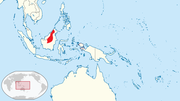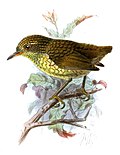
The brown boobook, also known as the brown hawk-owl, is an owl which is a resident breeder in south Asia from India, Sri Lanka, Bhutan, Bangladesh and Nepal east to western Indonesia and south China.

Thomas Horsfield was an American physician and naturalist who worked extensively in Indonesia, describing numerous species of plants and animals from the region. He was later a curator of the East India Company Museum in London.

The common iora is a small passerine bird found across the tropical Indian subcontinent and Southeast Asia, with populations showing plumage variations, some of which are designated as subspecies. A species found in scrub and forest, it is easily detected from its loud whistles and the bright colours. During the breeding season, males display by fluffing up their feathers and spiral in the air appearing like a green, black, yellow, and white ball.

The black-headed bulbul is a member of the bulbul family, Pycnonotidae. It is found in forests in south-eastern Asia.

The pin-striped tit-babbler, also known as the yellow-breasted babbler, is a species of bird in the Old World babbler family Timaliidae that is found in South and Southeast Asia.

The green broadbill also known as the lesser green broadbill is a small bird in the family Calyptomenidae. It was formerly classified in the family Eurylaimidae, a group of closely related birds that share the name "broadbill".
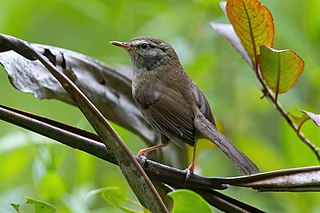
The aberrant bush warbler is a species in the bush warbler family, Cettiidae. It was formerly included in the "Old World warbler" assemblage.

The typical falconets, Microhierax, are a bird of prey genus in the family Falconidae. They are found in southeast Asia and the smallest members of Falconiformes, averaging about 15 cm (5.9 in) in length and 35 g (1.2 oz) in weight. The smallest members of the genus are the relatively widespread black-thighed falconet, and the white-fronted falconet on the island of Borneo.

The thick-billed green pigeon is a species of bird in the family Columbidae.

The ruby-cheeked sunbird is a species of sunbird in the family Nectariniidae.

Hose's broadbill is a species of bird in the family Calyptomenidae. It was described by the British naturalist Richard Bowdler Sharpe in 1892 and is named after the British zoologist Charles Hose, who collected the holotype of the species. It is 19–21 cm (7.5–8.3 in) long, with females weighing 92 g (3.2 oz) on average and males weighing 102–115 g (3.6–4.1 oz). Males are bright green and have conspicuous black spots on the wings, black markings on the head, blue underparts, black flight feathers, and a large green tuft covering most of the bill. Females have smaller forehead tufts, lime-green underparts with sky blue instead of azure blue on the undertail coverts, and lack black markings on the head, except for a black spot in front of the eye.

Whitehead's broadbill is a species of bird in the family Calyptomenidae. It is endemic to the mountain ranges of north-central Borneo, where it mainly inhabits montane forests and forest edges at elevations of 900–1,700 m (3,000–5,600 ft). It is 24–27 cm (9.4–10.6 in) long, with males weighing 142–171 g (5.0–6.0 oz) and females weighing 150–163 g (5.3–5.7 oz). Males are vivid green and have a black throat patch, black spots on the ear-coverts and back of the neck, and black markings and streaking all over the body. The tails and flight feathers are also blackish. Females are smaller and lack the black markings on the head and underparts. Juveniles look similar to adults but have fewer black markings.
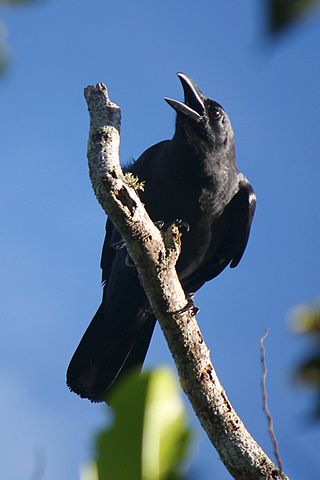
The Sunda crow, formerly known as the slender-billed crow, is a passerine bird of the family Corvidae, in the genus Corvus. It is found from Malaysia to Borneo. The violet crow has been shown to be distinct genetically and separated as Corvus violaceus. The small crow has been split as Corvus samarensis and the Palawan crow has also been split as Corvus pusillus.

The banded broadbill is a species of bird in the Eurylaimidae typical broadbill family found in Mainland Southeast Asia and the Greater Sunda Islands. It is sometimes split into two species, one including only the nominate subspecies, E. j. javanicus, and one including all the remaining subspecies. It inhabits a variety of forests, along with forest edge, rubber plantations and Falcataria falcata groves, mainly in lowland areas. A striking, large-bodied bird with a length of 21.5–23.0 cm (8.5–9.1 in), it is unlikely to be mistaken for another species. The broadbill is mostly purplish-red, with yellow-streaked black wings, a bright blue beak, a blackish face and greyish chin and upper breast. Females can be told apart from males by their lack of a black neckband, although these are indistinct in Bornean and Javan males. Despite its conspicuous appearance, the bird is usually hard to see due to its sluggishness and is usually only noticed when it vocalises.
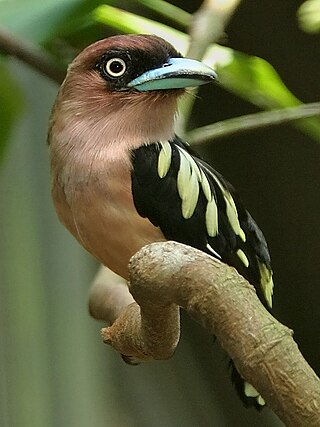
Eurylaimus is a genus of broadbills found in Southeast Asia.

The black-and-yellow broadbill is a species of bird in the typical broadbill family Eurylaimidae. A small, distinctive species, it has a black head, breastband, and upperparts, a white neckband, yellow streaking on the back and wings, and vinous-pink underparts that turn yellow towards the belly. The beak is bright blue, with a green tip to the upper mandible and black edges. It shows some sexual dimorphism, with the black breastband being incomplete in females.

Grauer's broadbill, also known as the African green broadbill, is a species of bird in the family Eurylaimidae, and is monotypic within the genus Pseudocalyptomena. Its name commemorates the German zoologist Rudolf Grauer who collected natural history specimens in the Belgian Congo.
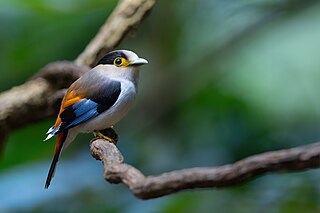
The silver-breasted broadbill is a species of bird in the broadbill family, Eurylaimidae that is found in parts of Southeast Asia. There are seven currently recognised subspecies; the other species in the genus Serilophus, the grey-lored broadbill, was also previously treated as being a subspecies of this species.
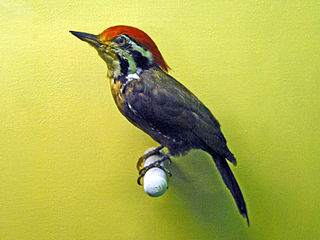
The olive-backed woodpecker is a species of bird in the woodpecker family Picidae that is found in Southeast Asia.

Swinhoe's white-eye is a bird species in the white-eye family Zosteropidae. It is found in east China, Taiwan, north Vietnam, the Thai-Malay Peninsula, Sumatra and Borneo. Populations have also been introduced throughout Southern California.






